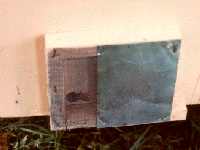
|

|
 New Zealand's variety of native floral sources, combined with a number
of introduced pasture and wild species, have created a unique range of
honey types and flavours. Beekeepers have always been quick to identify
and market these honeys, and now specific sources such as South Island
honeydew, manuka, thyme and ling heather attract premium prices
overseas. Other significant export honey products include comb honey,
high-moisture honey, honey and fruit spreads, and very light-coloured
honey (0-9mm on the Pfund honey grading scale).
New Zealand's variety of native floral sources, combined with a number
of introduced pasture and wild species, have created a unique range of
honey types and flavours. Beekeepers have always been quick to identify
and market these honeys, and now specific sources such as South Island
honeydew, manuka, thyme and ling heather attract premium prices
overseas. Other significant export honey products include comb honey,
high-moisture honey, honey and fruit spreads, and very light-coloured
honey (0-9mm on the Pfund honey grading scale).
About one third of New Zealand's annual production is exported, with the remainder sold as creamed and liquid spreads in retail supermarkets and food specialty shops. There is also a growing use of honey in the food manufacturing industry, with many leading companies keen to exploit the natural goodness of honey as a food ingredient in their products. New Zealanders are enthusiastic users of honey by world standards, consuming on average approximately 1.5 kg per person each year.
Honey production for the 1992-93 season totalled 7086 tonnes, or approximately 23 kg per hive. This compares to a six year average of 7698 tonnes (24 kg/hive). However, honey production is very weather dependant, and yields in the same six year period ranged between 17 kg/hive (1988-89) and 31 kg/hive (1991-92).
The unpaid pollination work honey bees do has an even greater benefit to the New Zealand agricultural system. Crops directly relying on bee pollination are worth over $1.2 billion per year, while pollination of pasture legumes provides more than $1.87 billion worth of nitrogen each year to the country's soils. Because it is impossible to identify a direct beneficiary for much of this pollination, some people mistakenly assume that this input does not have a value. However, agricultural economists worldwide now agree that the value of honey bees to the environment is worth up to 100 times the value of the actual honey and bee products they directly produce.
 The export of live bees has been a significant development in the New
Zealand beekeeping industry in recent years. Producers in this country
supply "packages" of worker bees and a queen to stock hives in the
northern hemisphere spring. Specialist queen producers also raise queen
bees which are used for hive increase and replacement of overwintered
queens, both in New Zealand and overseas. Currently the main markets for
package bees are in Canada, Korea and the Mideast, while queen bees are
shipped to countries as geographically and culturally diverse as Israel,
the United Kingdom and Japan.
The export of live bees has been a significant development in the New
Zealand beekeeping industry in recent years. Producers in this country
supply "packages" of worker bees and a queen to stock hives in the
northern hemisphere spring. Specialist queen producers also raise queen
bees which are used for hive increase and replacement of overwintered
queens, both in New Zealand and overseas. Currently the main markets for
package bees are in Canada, Korea and the Mideast, while queen bees are
shipped to countries as geographically and culturally diverse as Israel,
the United Kingdom and Japan.
New Zealand has an enviable reputation for both the quality and disease-free nature of its honey bee stocks. This has recently been recognised in the United States, where negotiations are currently under way to allow replacement stocks from New Zealand into areas being overtaken by the Africanised bee.
For the 1993 calendar year, package bees and queens were exported from New Zealand with an estimated total value of $1,783,585 FOB.
Propolis is also being used in a range of natural health care products, mostly due to its reputed properties as an antibiotic. Propolis is the bee-collected secretions of plants which is used as a glue and preservative in the hive. Several tonnes of propolis are collected each year by beekeepers and sold to heath products manufacturers.
Pollen has traditionally been collected from bees and used as a protein food supplement. Three to four tonnes are produced each year and sold either as raw pollen, or in combination with other materials.
Beeswax is another important by-product of honey production. Much of it is recycled by beekeeping supply houses and processed into comb foundation, which is used by beekeepers. However, another 150 to 200 tonnes is exported each year for use in cosmetics and candles.
 A variety of companies make equipment for the New Zealand beekeeping
industry, including hive woodware, honey-processing machinery and honey
containers. A substantial amount of this manufacture is also exported,
and New Zealand has gained a reputation overseas for its high quality
and innovative beekeeping supplies.
A variety of companies make equipment for the New Zealand beekeeping
industry, including hive woodware, honey-processing machinery and honey
containers. A substantial amount of this manufacture is also exported,
and New Zealand has gained a reputation overseas for its high quality
and innovative beekeeping supplies.
Home NZ Bkpg Bee Diseases Organisation Information Contacts
Email to Nick Wallingford, webmaster of the site...